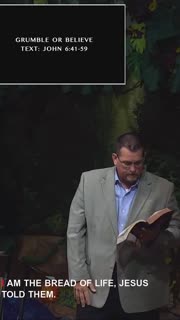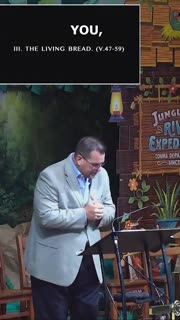Embracing Christ: The Bread of Life and Faith
Devotional
Sermon Summary
Bible Study Guide
Sermon Clips
### Quotes for Outreach
1. "The truth is that America needs Jesus Christ the truth is also that most people don't even realize it. Lord, we pray for this morning for unity and peace and civility for our country. We need to be one nation under God again. We have proved that we cannot do that without your help." [04:33] (24 seconds)
2. "I am the bread of life, Jesus told them. No one comes to me will ever be hungry, and no one who believes in me will ever be thirsty again. But as I told you, you've seen me, and yet you do not believe. Everyone the Father gives me will come to me, and the one who comes to me I will never cast out." [34:05] (21 seconds)
3. "Truly I tell you, anyone who believes has eternal life. I am the bread of life. Do you get the sense that He's trying to give them, time after time after time? He's saying the same thing. He's just saying it in a different way. But now He said, I am the bread of life over and over again." [01:03:20] (22 seconds)
4. "I am the living bread that comes down from heaven. If anyone eats of this bread, he will live forever. The bread that I will give for the life of the world is my flesh. At that, the Jews argued. They're still complaining. They're still murmuring. Jesus is saying, grumble or believe and they're choosing to grumble and complain." [01:05:52] (29 seconds)
5. "Salvation is never achieved apart from the drawing power of God and it is never consummated apart from the willingness of humans to hear and learn from God. To choose one or the other will ultimately end in unbalanced and an unbiblical theology." [01:17:38] (21 seconds)
### Quotes for Members
1. "Grumbling comes from our agreement with something that is contrary to the will of God. It is, by definition, a symptom of faithlessness. And so our mouth declares our agreement with hopelessness. That's what happens every time you complain." [41:14] (24 seconds)
2. "Notice that when people grumble, there is usually a healthy dose of sarcasm and anger that goes with the grumbling and the complaining. It's no different here. Look at verse 42. They were saying, isn't this Jesus, the son of Joseph, whose father and mother we know, how can he now say, I have come down from heaven?" [42:00] (25 seconds)
3. "We need to hear that this morning. We need to stop grumbling among ourselves. We need to stop complaining. You say, Pastor, I've got a legitimate complaint. No, you don't. It doesn't matter what your complaint is. It's not legitimate. Because the second you start doing it, it becomes a sin." [48:30] (19 seconds)
4. "You want to keep eating this manna that falls out of the sky? Hey, you can do it just like your ancestors did because you're not going to be satisfied with that. You're going to cook it every way you can think of and it's going to get old and you're going to complain and you're going to murmur and you're going to continue to walk around until you die. So you choose. You want to grumble or you want to live?" [01:08:49] (25 seconds)
5. "Salvation is never achieved apart from the drawing power of God and it is never consummated apart from the willingness of humans to hear and learn from God. To choose one or the other will ultimately end in unbalanced and an unbiblical theology. I don't know about you but I want a balanced theology." [01:17:38] (25 seconds)
Ask a question about this sermon
1. "The truth is that America needs Jesus Christ the truth is also that most people don't even realize it. Lord, we pray for this morning for unity and peace and civility for our country. We need to be one nation under God again. We have proved that we cannot do that without your help." [04:33] (24 seconds)
2. "I am the bread of life, Jesus told them. No one comes to me will ever be hungry, and no one who believes in me will ever be thirsty again. But as I told you, you've seen me, and yet you do not believe. Everyone the Father gives me will come to me, and the one who comes to me I will never cast out." [34:05] (21 seconds)
3. "Truly I tell you, anyone who believes has eternal life. I am the bread of life. Do you get the sense that He's trying to give them, time after time after time? He's saying the same thing. He's just saying it in a different way. But now He said, I am the bread of life over and over again." [01:03:20] (22 seconds)
4. "I am the living bread that comes down from heaven. If anyone eats of this bread, he will live forever. The bread that I will give for the life of the world is my flesh. At that, the Jews argued. They're still complaining. They're still murmuring. Jesus is saying, grumble or believe and they're choosing to grumble and complain." [01:05:52] (29 seconds)
5. "Salvation is never achieved apart from the drawing power of God and it is never consummated apart from the willingness of humans to hear and learn from God. To choose one or the other will ultimately end in unbalanced and an unbiblical theology." [01:17:38] (21 seconds)
### Quotes for Members
1. "Grumbling comes from our agreement with something that is contrary to the will of God. It is, by definition, a symptom of faithlessness. And so our mouth declares our agreement with hopelessness. That's what happens every time you complain." [41:14] (24 seconds)
2. "Notice that when people grumble, there is usually a healthy dose of sarcasm and anger that goes with the grumbling and the complaining. It's no different here. Look at verse 42. They were saying, isn't this Jesus, the son of Joseph, whose father and mother we know, how can he now say, I have come down from heaven?" [42:00] (25 seconds)
3. "We need to hear that this morning. We need to stop grumbling among ourselves. We need to stop complaining. You say, Pastor, I've got a legitimate complaint. No, you don't. It doesn't matter what your complaint is. It's not legitimate. Because the second you start doing it, it becomes a sin." [48:30] (19 seconds)
4. "You want to keep eating this manna that falls out of the sky? Hey, you can do it just like your ancestors did because you're not going to be satisfied with that. You're going to cook it every way you can think of and it's going to get old and you're going to complain and you're going to murmur and you're going to continue to walk around until you die. So you choose. You want to grumble or you want to live?" [01:08:49] (25 seconds)
5. "Salvation is never achieved apart from the drawing power of God and it is never consummated apart from the willingness of humans to hear and learn from God. To choose one or the other will ultimately end in unbalanced and an unbiblical theology. I don't know about you but I want a balanced theology." [01:17:38] (25 seconds)










